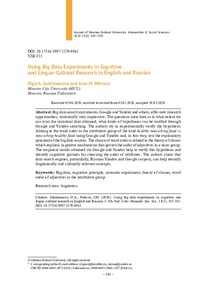Using Big Data Experiments in Cognitive and Linguo-Cultural Research in English and Russian
Скачать файл:
URI (для ссылок/цитирований):
https://elib.sfu-kras.ru/handle/2311/135166Автор:
Suleimanova, Olga A.
Petrova, Inna M.
Сулейманова, О.А.
Петрова, И.М.
Дата:
2020-03Журнал:
Журнал Сибирского федерального университета. Гуманитарные науки. Journal of Siberian Federal University. Humanities & Social Sciences;2020 13 (3)Аннотация:
Big data search instruments, Google and Yandex and others, offer new research opportunities, statistically very impressive. The questions arise here as to what extent we can trust the statistical data obtained, what kinds of hypotheses can be verified through Google and Yandex searching. The authors try to experimentally verify the hypothesis relating to the word order in the attributive group of the kind healthy nourishing food vs nourishing healthy food using Google and Yandex and, in this way, test the explanatory potential of the big data sources. The choice of word order is related to the theory of classes which explains cognitive mechanisms that govern the order of adjectives in a noun group. The empirical results obtained via Google and Yandex help to verify this hypothesis and identify cognitive grounds for choosing the order of attributes. The authors claim that data search engines, particularly, Russian Yandex and Google corpora, can help identify linguistically and culturally relevant concepts Инструменты получения больших данных, Google, Яндекс и
другие, предоставляют статистику, которая открывает новые возможности для
исследователей. Это, в свою очередь, порождает вопросы о надежности таких
данных, а также о том, какие гипотезы могут быть проверены с помощью поиска
в Google и Яндексе. Авторы экспериментально проверяют гипотезу, связанную с
порядком слов в атрибутивной группе типа healthy nourishing food vs nourishing
healthy food, используя Google и Яндекс, и, таким образом, подтверждают
объяснительный потенциал данных инструментариев. Выбор порядка следования
атрибутов в группе связан с теорией классов, которая объясняет когнитивные
механизмы, управляющие очередностью расположения прилагательных.
Эмпирические результаты, полученные с помощью Google и Яндекса, позволяют
подтвердить эту гипотезу и выявить когнитивные основания для выбора порядка
следования атрибутов. Авторы утверждают, что поисковые системы, в частности
русскоязычный Яндекс и англоязычный Google, могут быть полезны при
исследовании языковых и культурно значимых концептов

